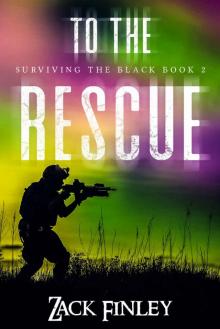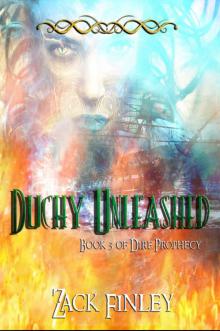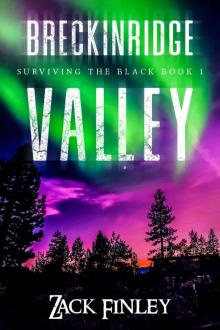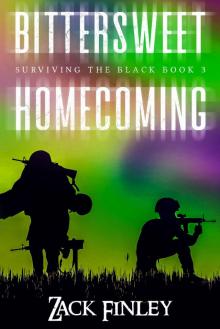- Home
- Zack Finley
Breckinridge Valley: Surviving the Black--Book 1 of a Post-Apocalyptical series Page 3
Breckinridge Valley: Surviving the Black--Book 1 of a Post-Apocalyptical series Read online
Page 3
The situation on the ground would dictate what happened after the initial problem passed. No significant fallout, then radiation wasn’t a substantial factor. Just about every scenario knocked down the electrical grid, leading to shortages of everything. In a global pandemic, we’d need quarantine protocols.
I pulled the action plan for nuclear attack.
With warning the situation was deteriorating, we’d recall anyone who wanted to assemble in the valley. This triggered the closure and transfer of the solar store: harvesting all viable produce from gardens, orchards, and fields; and deploying plastic sheeting over the gardening areas and as much of the pasture land as time allowed. Top off gasoline, food, water, and then prepare to enter the shelters including livestock.
Once we were sure the bombs stopped falling and the nuclear fallout reached the dispersed phase, the next stage would depend on the level of civil unrest and quantity of fallout. One of the first actions was a series of expeditions to retrieve allies caught outside the Valley.
Dealing with fallout was the most challenging topic. Returning the farmland to productive use depended on the extent of the early fallout. The farm had the equipment to scrape the surface of our farmland or to plow it under, depending on the quantity and terrain. There were even locations designated to store the contaminated soil.
All motorized equipment was stored to protect against most EMP. The heavy diesel equipment was considered too old to be seriously impacted even by the most severe EMP.
Firehoses would be used to wash down hard surfaces with the water directed to settling basins.
Because we couldn’t count on a warning, farm equipment was always stored inside except when in use. Silage and hay were also covered. A sizeable future gardening area was covered in plastic, year ‘round to protect the soil from contamination.
With sufficient warning, large areas of pasture or farmland could be covered with plastic. Getting the livestock inside was the toughest challenge without notice. That explained why my dad always kept a small herd of breeding stock in a pasture near the shelters. Getting them into the shelters was a high priority task.
The valley was not close to any expected bomb targets, so we weren’t expecting any explosive impacts. Each residence maintained a safe room in the basement, also designed as a fallout shelter. The houses themselves were designed to protect residents from moderate radiation exposures. Unless the blast was a lot closer than anyone expected, most people in the valley wouldn’t even need to go to the safe room after the first two days, as long as the shutters, vents, and doors remained closed.
Each house in the valley was expected to solely use the exterior door which opened into the mudroom. In a radiation emergency, it was the only authorized entrance. The mudroom could be converted into decontamination zones using tarps and kiddy pools.
I was impressed with how comprehensive The Plan was. While the substantial underground storage areas were expensive, the main out of pocket expenses were materials and equipment. Most of the labor was supplied by valley residents or allies. Most were even tax deductible as farm expenses. Even the modifications to the houses nearly paid for themselves with low utility costs. The solar business was a stroke of genius on my dad’s part. I was also proud to see he was doing what he could to help our neighbors, even if they didn’t fully appreciate it.
My brother Steve and his wife Mandy ran the solar business. They also lived in Huntsville next to the business. I was confident it was designed to be a defensible hub for our Huntsville allies.
I now understood why my dad needed help. The plan had a lot of moving parts. Just making sure the stored food wasn’t spoiled would be enough of a challenge. And most everyone involved were volunteers in their 60s.
I needed to understand the bigger picture. Were we just planning on being the last family alive in Tennessee or what? I’d fight like hell to keep my girls alive but for what kind of future?
◆◆◆
Chapter 3
I closed The Plan room and joined my folks at the kitchen table. My mom brought me a bowl of soup and some home-made buttered bread. I was hungry after only coffee for breakfast.
My dad set aside his empty bowl. “What do you think?”
“You have taken this a lot farther than grandpa,” I said. “I want to see all that storage. I can’t believe how much is buried and out of sight.”
“One of my buddies experienced a lull in his earthmoving business during the recession. He moved a few hills for me. There were a lot of metal building companies stuck with a high inventory at the same time. I wasn’t the only one planning to cover the buildings with dirt, so they came with a special coating to reduce corrosion. Some geofabric mats and now we have barns and storage protected against moderate radiation,” my dad said. “There were a lot of storage containers available at that time, too. We had the cash and stacked them all over. They aren’t all full, but I got an excellent deal on them.”
“I’ll check it out,” I promised. “What I’m curious about is what is our end game?”
“Straight for the jugular,” my mom said, poking my dad in the side. “I told you.”
“I don’t know,” my dad said. “It really depends on the event. Nuclear war and nuclear winter, it will just be about surviving for as long as we can. We can probably save family and allies, but we’ll be hard pressed to do much beyond that. EMP and invasion will be all about surviving and mounting a guerrilla resistance as best we can. EMP or CME will bring the country down, but there should be enough resilience to start rebuilding after the big die off.”
“Have you talked about this with those outside?” I asked.
“I talked off-the-record with Sheriff Lewis, local pastors, and some key businessmen, but no preplanning. They all think I’m nuts. They are grateful for my help on their solar stuff, but they don’t want to look ahead. We’ve done what we can, but they refuse to consider how fragile our lives are. We have a strong position in Huntsville, but I’m prepared to abandon it if we need to. We certainly can’t stay there if we get a lot of refugees from Nashville or Chattanooga,” my dad said.
“I saw we have about 250 family and allies, though some are inactive,” I said. “How many can we feed?”
“If we go biointensive we can feed about four people per acre, but that takes two full-time farmers. We have about 5,000 flat acres in the valley. I’ve set aside some of that for horses and cows, so not all is available for people food, but we can certainly keep much of Mecklin County fed if need be. That is assuming no nuclear winter and low fallout. It also assumes people will be willing to work to eat. Using less manpower intensive methods, the yield drops off per acre. It just depends on manpower,” dad said. “Bread is going to be trouble. We’ve got seeds for dry corn, wheat, spelt, oats, and amaranth, but I doubt we will be eating much bread in the first few years. Tortillas and Johnnie cakes will probably replace bread.”
“I saw the plans for the barracks, is that where most of our allies will stay?”
“If we have to fall back to the valley, yes. If not, they will probably house people we choose to take in. All of our homes in the valley can reasonably hold two or three more families, so that will be the first choice for allies. I’m expecting joint meal preparations once we can move around. More efficient that way,” my mom said. “Having enough people to do everything that needs doing will be problematic.”
“Travel is going to become very difficult,” my dad added. “Expect to return to the horse and buggy days. Gasoline and diesel are the most precious resource we have. Once what we have saved is gone, we won’t see anymore. We can grow soybeans or rapeseed to make biodiesel, but it won’t provide enough except for emergencies. It will also be a tradeoff between fuel and food. We have a small seed press in storage. The pressed cake makes good animal feed. That is part of why I think biointensive is our best bet long term. We don’t need powered farm equipment. Jacob and Rachel have agreed to teach Mennonite growing methods, too. Their methods are lar
ger scale than biointensive, so we will have to work out what types of crops make sense for them to grow.”
“What is a CME,” I finally asked. “I know what EMPs are, but CME eludes me.”
“CME stands for coronal mass ejection. Basically, the sun vomits. Small ones happen daily, but once in a while, a big eruption occurs. If the one which hit the earth in 1859 hit today, it would take out our entire electrical grid for a long time. It is particularly damaging to transformers. Once they are ruined, then we will be in the dark for years, if power was the only problem. Unfortunately, that will knock over the next domino in the chain until it cascades around the globe. No power, no communication, no water, no gasoline, no food deliveries, and then civilization collapses,” my mom said. “We’ve been hit with smaller CMEs since 1859 that have taken out area grids, but nothing of the magnitude seen in 1859. Most experts think systems tied into the electrical grid will be fried, but most stand-alone electronics should be okay. Landlines will likely be fried, too. It will probably be a slow-motion collapse. But once the generators and batteries run down, that will be it.”
“Sunspots will do all that?” I asked.
“Not sunspots, but solar flares will probably accompany the ejection, and some people believe it could even reverse the earth’s magnetic poles. I don’t buy into that, but it could happen,” she replied. “NASA monitors the sun weather forecast in real time. We should get at least a 15-hour warning in advance,” she continued. “One of our allies monitors several sites and will get a real-time alert. We considered buying the local electrical co-op so we could keep the local grid up, but that won’t buy much time before the whole transportation grid collapses. Having power when no one else has any would attract a lot of refugees, which we can’t feed.”
“We bought a used transformer we could use to get the local grid up if we ever get the chance,” my dad added. “Got it from an old coal plant for scrap value. It’s old but still viable.”
“He’s hoping to get power from one of the nearby dams and light up this part of Tennessee,” my mom chided. “He also has his eye on a pair of coal-fired railroad engines in the railroad museum outside of Chattanooga.”
“I also picked up an old telephone exchange for scrap, too,” my dad said, unperturbed. “Small telephone companies were big in the 1890s, no reason we can’t set one up, too. The wires are all there.”
“Look, son,” my dad said, “If it is an all-out nuclear war we are fucked, and survival is all we can hope for. Take care of our own and hold out for as long as we can. If we can wait through the die out, then we will work with what is left. But if it is just EMP or CME, then we have a chance to save our corner of Tennessee and maybe a few elements of civilization, too. There is nothing that will save those in the cities. I just hope our inactive members can get here in time. They are scattered all over the country, but they’ll be welcome if they make it back.”
I don’t know why I was surprised my dad was looking beyond the valley. We never actually talked about this before. I always assumed it was all about hiding in our bunkers.
“None of that works if we can’t care for our own, though,” my dad said. “My group is dedicated, but we are getting old. If we can’t recruit younger people, all these preparations will be for nothing. When I got out of the Army, Pops helped my Army buddies start businesses nearby. I knew they could be counted on and that was worth a lot. I can still count on them, but most of our kids, have drifted away. If we get any kind of warning, they’ll be able to get back home. If not, it will be brutal on the road, but at least they have someplace to aim for.”
I thought of Jules, now living in California. In any doomsday scenario, he would be toast.
My dad continued, “I thought you could do the same with your Army buddies. I know officers are different, but you know who you can count on when it gets tough. I also know that vets coming home have a difficult time fitting into civilian life. I want to invest in them rather than put more money into Wall Street.”
A jolt went through me as I finally understood some of my dad’s motivation for this survival stuff. I’d do almost anything to help my guys. He must have felt the same way. Except he did something. There is a painful closeness gained from shared brutal combat. It has no parallel I’ve experienced.
My mind raced as I realized that I didn’t know how most of the men who left my unit were doing. An occasional email, but what did I really know? I learned of two who killed themselves. Others slipped into alcohol or drugs. What if I could help them? Many wouldn’t be satisfied just to make money, they needed a reason greater than themselves to get up every day. Prepping could give them that.
“We even have a junior college outside Huntsville now, if they want to get a degree,” my dad added, seemingly unaware of my epiphany.
When I looked him in the eye, he grinned. He knew I finally got it. We’d be ready for a disaster, but it was really about building a community and taking care of who we could. Not everyone would be interested in living in rural Tennessee, but some would be.
◆◆◆
Chapter 4
It was a busy year. Melissa was finally sleeping in her own bed most nights. Jennifer was starting to believe I was staying in her life. A counselor at the Huntsville clinic helped us both set aside some of our guilt.
I expanded on my earlier plan to only recruit people I bled with to include all Rangers. I told my former general about our efforts to help with their transition back to civilian life. He put me in touch with the right people. Everyone accepted in the program was still sponsored by someone I trusted, but so far, I was delighted with our recruits.
Mecklin County saw a new business boom as more Rangers settled nearby.
Craig, a talented sniper, was living with us while attending the Huntsville technical college. He was also enrolled in the local Alcoholics Anonymous chapter, now sober for nearly 6 months. Craig wasn’t the only Ranger clawing his way back.
I’d now met everyone in the valley and all our active duty allies. Dr. Amelie Jerrod was our resident doctor. Her kids Jimmie and Clarice were the two African-Americans I met at the school bus stop the day I told my folks about my discharge papers.
My dad recruited Dr. Jerrod to practice at the Mecklin County Hospital in Oneida. She was a fully committed member of the valley team. She was a child refugee and understood what happened when civilization crumbles. I’m still not sure what happened to her husband, but neither she nor her kids ever mention him.
We upgraded our armory. Zeke, a Ranger who lost his right leg to an IED blast bought a sporting goods shop in nearby Oneida. Most of his store’s extensive weapons inventory is now stored in the valley. We acquired more exotic firearms from gun shows or through private purchases. We were lucky that Tennessee now allows weapon suppressors. My Rangers are fond of their M4s, especially when suppressed. We now have a lot more firepower.
We’ve added some serious compound bows and arrows to conserve ammo. Nearly everyone has already bagged a deer this archery season, with hunts being organized every weekend since the season opened. All the hunts are on land we own and is a good way for them to familiarize themselves with the area.
I got two armored Humvees as Army surplus delivered by truck. They weren’t street legal and remained tucked away in one of our equipment storage areas with a pair of M2 Browning .50 calibers mounted in the turrets. The turret protection wasn’t as extensive as I wanted, but we could add on if necessary.
We just got in 100 full sets of the Army’s newest modular, scalable body armor. It was pricy, but I thought well worth it. Every member of the valley security force already had some version of body armor. They could keep them, but this way we could stock only one type of replacement plates.
Huntsville may be the county seat, but it only has 1,000 residents. Oneida is three times the size and is just a few miles farther away. It has an airport and the local, national guard armory.
Several of my men hired on with local contractors to train
as heavy equipment operators. The valley underwrote their training expenses. That worked out well for everyone. The contractors were thrilled with their work ethic, while the valley covered all the training expenses.
Almost all of my guys were now single, some divorced. We built a small apartment complex in Huntsville with a large basement with several off-the-book features. It was also a lot more defensible than a typical apartment building. I was amazed at how little the additions cost. The guys paid rent, just like any other tenants. The valley rented all the empty apartments until someone showed up who needed a place to live.
The hardest part of pulling this off was getting in touch with those I served with. For some it was easy, but others required private investigators. Especially for those who dropped out.
Not everyone I contacted wanted to live in Tennessee, but enough did that there was a steady trickle of young men moving to Mecklin County. A few wanted to farm, but most lived in town and worked locally. I was surprised that only a handful desired the complications of starting up a business. Those that did start a business hired first from within.

 To the Rescue; Surviving the Black--Book 2 of a Post-Apocalyptical Series
To the Rescue; Surviving the Black--Book 2 of a Post-Apocalyptical Series Dire Prophecy
Dire Prophecy Duchy Unleashed
Duchy Unleashed Mad Toffad's Keep
Mad Toffad's Keep Breckinridge Valley: Surviving the Black--Book 1 of a Post-Apocalyptical series
Breckinridge Valley: Surviving the Black--Book 1 of a Post-Apocalyptical series Bittersweet Homecoming; Surviving the Black--Book 3 of a Post-Apocalyptical Series
Bittersweet Homecoming; Surviving the Black--Book 3 of a Post-Apocalyptical Series